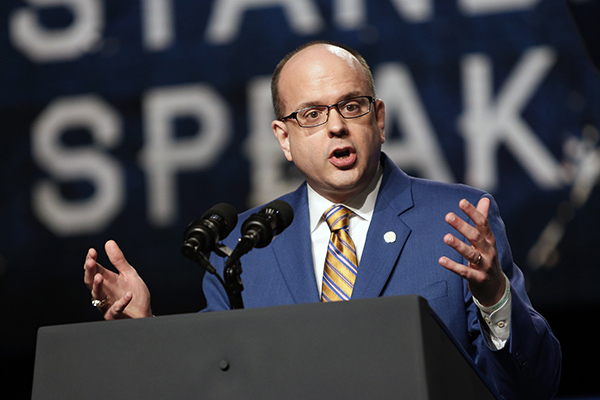Lay persons, pastors, churches, state conventions and Southern Baptist Convention (SBC) entities all have a role in an evangelism renewal plan Southern Baptists adopted June 13 at the SBC annual meeting.
Messengers adopted an eight-pronged approach recommended by an Evangelism Task Force that Steve Gaines appointed in 2017 in his final term as SBC president. Task Force vice chairman Adam W. Greenway presented the plan to messengers after first releasing the document June 11.
“It will take all of us working together in unity for the task of the Great Commission to be accomplished,” said Greenway, dean of Southern Baptist Theological Seminary’s Billy Graham School of Missions, Evangelism and Ministry in Louisville, Kentucky. “Every one of us has a part to play. This is a critical task for us.”
Before the vote, the task force concurrently submitted to messengers a 12-point Evangelism Articles of Affirmation and Denial, based on and supported by Scripture.
“We wanted to take the opportunity to provide a clear set of principles in terms of things we believe Southern Baptists can heartily affirm as it comes to speaking about evangelism,” Greenway said, “and with clarity saying things we do not believe evangelism entails.”
Stance on evangelism
“One of the most important things we can give to our convention of churches, and to a watching world, is a clear statement about … where Southern Baptists stand on the issues related to evangelism.”
Southern Baptist churches are autonomous and are not obligated to put the recommendations into action but are encouraged to embrace the report as a ready and viable church resource.
The task force called on all Southern Baptists to “renew with great urgency the priority of evangelizing the next generations” and to adapt the recommended methodology to individual environments “without changing our theology.”
“If the only people who ever hear you talk about the gospel are already believers,” Greenway said on the annual meeting stage, “then you are not being gospel-centered. You’re not committed to sharing the gospel.
“It was never meant to be merely an intramural subject for debate,” he said of the gospel. “It was meant to be the intentional passion that we declare to lost people — that there is hope in Jesus Christ.” (BP)






Share with others: